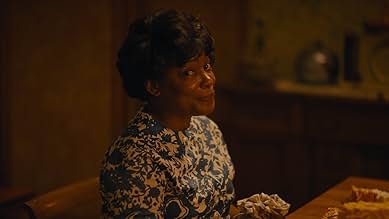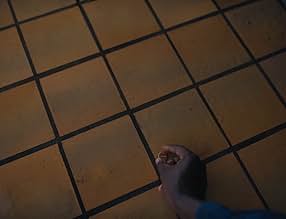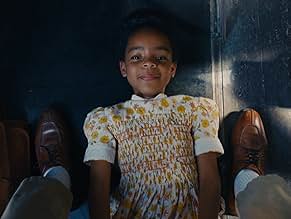Basada en la novela de Colson Whitehead ganadora del Premio Pulitzer, Nickel Boys narra la poderosa amistad entre dos jóvenes afroamericanos que atraviesan juntos las duras pruebas del refor... Leer todoBasada en la novela de Colson Whitehead ganadora del Premio Pulitzer, Nickel Boys narra la poderosa amistad entre dos jóvenes afroamericanos que atraviesan juntos las duras pruebas del reformatorio de Florida.Basada en la novela de Colson Whitehead ganadora del Premio Pulitzer, Nickel Boys narra la poderosa amistad entre dos jóvenes afroamericanos que atraviesan juntos las duras pruebas del reformatorio de Florida.
- Dirección
- Guionistas
- Elenco
- Nominado a 2 premios Óscar
- 60 premios ganados y 179 nominaciones en total
- White Boy
- (as Zachary Luke Van Zandt)
- Dirección
- Guionistas
- Todo el elenco y el equipo
- Producción, taquilla y más en IMDbPro
Resumen
Opiniones destacadas
The film is shot in a POV style where the camera is meant to represent the character's perspective, which ends up being wildly distracting. Not only does this approach pull you out of the action, but there are moments where you're left wondering what the hell you're even looking at. For example, there are several shots of the back of someone's head. Who is seeing that? Are we supposed to believe the character can see the back of their own skull?
I shouldn't have to ask questions like that. And I wouldn't, if the film had drawn me in. But the overly gimmicky style makes that impossible. This could have been a very powerful movie-the subject matter certainly deserves it. However, the overly clever filmmaking drains it of any real impact.
The acting and writing just barely manage to save it from being a complete disaster, but you still leave the theater wanting so much more.
"Nickel Boys" is bi-perspectival. We experience the gazes of two different characters, Elwood and Turner, teenagers incarcerated in a Jim Crowe-era juvenile detention center that amounts to a borderline death-camp for its Black prisoners. I was struck by the similarities and differences between "Nickel Boys" and "Hunger", another overpowering work on life-in-detention. The older film is about the body to a visceral degree that few other movies have attempted and the result is a work of relentless objectivity. "Nickel Boys", by contrast, is about the effects of trauma and imprisonment on the mind and memory- a relentlessly subjective piece.
The tone is thus very different from that of most bleak prison dramas, at times almost affirmational. We're experiencing, literally seeing, the way Elwood and Turner view their conditions in ways that make their situation tolerable- largely by focusing on their friendship- each other's faces- and those of their loved ones. This is not to say that the film is artificially pleasant. One of the best scenes consists of a single long take of a conversation in a bar years after the events depicted in most of the film have taken place. It's a remarkably well staged and performed scene featuring brief but memorable work by actor Sam Malone as Percy, one of the detention center's survivors, uttering the horrors he witnessed in a tone that suggests that even years later he can barely cope with what he saw. Experiences like those inflicted on the characters perhaps cause more damage after the fact than during the actual experience when survival instinct takes over.
The bi-perspectival construction of the film also demonstrates the ways that experiences and memories are never fully constructed or belonging to any one individual. Elwood and Turner, for all of their differences, come to seem almost like one character. We start to forget, or care, about whose perspective we are viewing. These men are forging this part of their lives together- they are co-authors of each other's experience. In this sense, "Nickel Boys" is about themes larger than imprisonment and injustice. It's about the ways that time and memory enact experience, both making it palatable but in the process leaving defining scars. The film's final montage features images of cellular reality- our being recreating itself through creation and destruction even within a single lifetime.
"Nickel Boys" is not a perfect movie. Ross's previous work had been as a documentarian and the script he co-wrote with Joslyn Barnes and Colson Whitehead is characterized by some clunky, overly on-the-nose dialog. However, this makes the powerful performance of said dialog by stars Ethan Herisse, Brandon Wilson, and especially Aunjanue Ellis-Taylor as Elwood's grandmother, all the more impressive.
What a train wreck. Seriously. I think this director has a great future, but he threw everything into this film but the kitchen sink. I hated the hand held shaky cam stuff. Why did he do that? It tended to be more shaky early in the film so it kind of set me off early and the story and acting had to win me back. The way POV was utilized throughout was very distracting. We are seeing everything unfold through the character on the screens eyes. At times it is really confusing. The camera is the character. No normal film type interactions at all. Sure if works from time to time, but overall it is annoying. The set up to when Elwood gets in trouble is very long and not well constructed. I have not read the novel but I would guess it has a section about the (limited?) legal process that occurs. It would have been a nice touch. Loved some of the odd montages. Hated others. I still gave it a 7., for the gripping story this film tells, but man ,what a weird film.
I'm now going to list all those 'fresh' approaches of the director. However, I cannot find the 'purpose' of these approaches. Why does he choose these specific tools and forms to create what effect on the audience? None of them are answered. First, screen ratio. The director chooses a 1.33:1 ratio. It rather feels stuffed, blocking a wider view. My sight is blocked the whole time. Second, lots of montage, jagged editing, and lots of quick cuts. Again, I don't know why the director chooses this way, and I'm sure his intention has failed because It feels chopped and segmented, hindering the continuity and the flow of the movie and making the ending more confusing. In addition to these editing problems, story development is slow, making things worse.
This was hard to watch mostly becausse of the unfortunate truths it portrayed.
Injustice is never an easy thing to swallow. At least for me.
This movie is definitely worth watching if only to inform yourself about the darkness of our past.
But at a 2:20 runtime, it felt somewhat tedious.
I get that the long runtime was meant to correspond to the long suffering of african americans and the lengthy civil rights struggle, but ultimately, it's message suffered for it.
Its poignant story might've been better served as quick, aggressive and brutal. Rather than as the slow and painstaking story it told.
5 Film Recs From Director RaMell Ross
5 Film Recs From Director RaMell Ross
¿Sabías que…?
- TriviaIn an interview with Vanity Fair, director RaMell Ross states ""The film is conceived as all one-ers. In one scene, we shot everything from Elwood's perspective, and then everything from Turner's--one from the first hour, and then the other for the second. Very rarely did we shoot both perspectives on a scene, though, because of the way it was written and scripted. We don't always go back and forth. So it's shot like a traditional film, except the other character is not there. They're just asked to look at a specific point in the camera. Typically, the other actor is behind the camera, reading the lines and being the support to make the other person feel like they're actually engaged with something relatively real. Because they're all one-ers, though, the choreography is quite difficult."
- ErroresEarly in the movie, when MLK is shown on various TV screens in the window of a store, you can see the camera's reflection in the bottom left of the screen.
- Citas
Turner: This can be a three-day job we play it right. We till the garden and fix up her house, she may even adopt our black asses. Well not you, you got family. I'd yessum her for a chance out of Nickel.
Elwood: That ain't no freedom. I mean you know Director Hardee and his wife ain't supposed to use us like we're slaves.
Turner: Man, all those guys on the school board have us do chores. Sometimes it's favors, sometimes it's for real money.
Elwood: But it's against the law.
Turner: [Turner laughs] Man, the law's one thing. You can march and wave signs around and change a law if you convince enough white people. I saw those college kids in Tampa with their nice shirts and ties sitting at the Woolworth's. I had to work, but they were out protesting. And it happened, they opened that counter. But I didn't have the money to eat there either way. Gotta change the economics of all this, too.
Elwood: My grandma got me that lawyer, man. Make a move there, first.
Turner: The courts play both the white and the black. They just move us around when they're ready.
Elwood: And we have to be like knights. Checkmate.
Turner: How many people you know done that, El? There's four ways out of Nickel. Serve your time -or age out-. Court might intervene -if you believe in miracles-. You could die -they could kill you-. You could run. Only four ways out of Nickel.
- ConexionesFeatured in WatchMojo: Top 10 Best Movies of 2024 (2024)
- Bandas sonorasYoung Girl
Written, Composed, and Produced by Herschel Dwellingham
Performed by Frank Lynch
Courtesy of Grass of Home Productions and Publishing (BMI)
Selecciones populares
- How long is Nickel Boys?Con tecnología de Alexa
Detalles
Taquilla
- Presupuesto
- USD 20,000,000 (estimado)
- Total en EE. UU. y Canadá
- USD 2,858,346
- Fin de semana de estreno en EE. UU. y Canadá
- USD 54,794
- 15 dic 2024
- Total a nivel mundial
- USD 3,016,380
- Tiempo de ejecución2 horas 20 minutos
- Color
- Relación de aspecto
- 1.33 : 1
Contribuir a esta página






































